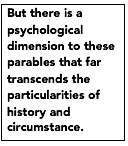|
"The kingdom of heaven is like . . ."
We are so small, we humans. The odds against any one of us existing are
so stupendous the numbers dwarf us. A hundred million of our father’s sperm—sifted
down to a few dozen that reached the neighborhood of one particular ovum at one fleeting moment—were other possible candidates for life, not us.
In most cases, one seed joins one egg in the start of you or me. Multiply this event by days and months and years of fertility, other possible spouses and lost
ancestors, and the unlikelihood of our being conceived is greater than our chances to win the super-lottery every day of a lifetime.
Yet, here we are, in a solar system that is a speck in a field of stars. Creation is like that, a great lotto of life, a sea of rushing graces and missed chances.
In all the happenstance of history and space, the good lasts, the gospel tells us. It is worth the vast expenditure of matter and energy to gain the good. It
is worth  all the misfortune to reap the benefit. Fruit grows amid the weeds. Life and waste walk hand in hand. Gain and loss are partners. But the loss, the
waste, is endured for the sake of the yield. all the misfortune to reap the benefit. Fruit grows amid the weeds. Life and waste walk hand in hand. Gain and loss are partners. But the loss, the
waste, is endured for the sake of the yield.
What is more, the fruit starts so small. Like one act of love, one time of kindness, one moment of courage, growth is imperceptible in the seeding. The mustard seed,
once so tiny, becomes a great shrub, the home to wayfaring birds of passage. So it is in Jesus’ other analogy for the reign of God: a bit of yeast permeates
and quickens the batch of flour.
The use of parables, a tradition rooted in wisdom and rabbinical literature, is a hallmark of Jesus’ teaching.
No doubt the particular images of mustard seed and leaven struck home not only
to his hearers, but also to the early Christian community, quite conscious of the worldly insignificance of Jesus and its own smallness in contrast to Judaism
and the Roman Empire. They believed the reign of God would come, just as surely as the harvest, despite obstacles and setbacks.
But there is a psychological dimension to these parables that far transcends the particularities of history and circumstance.
We are so afraid of our smallness. On the scale of matter, big is better. What is large is impressive. The grand is good. The small seems weak and vulnerable.
But thinking so, we fail to see the wisdom of life, the promise of smallness, the world not of mere matter, but of spirit.
Have we not all felt the grace that rises from the least? The early free smile of a child? The first kiss? The initial act of kindness? The fragile promise
made with full heart? Each of us, so inconsequential in history’s chamber, so
lost in vast spaces measured by light years, bears a power not quantified by weight and measure.
The human heart, small and frail by cosmic standards, rises to heights out of its very frailty when it loves, hopes, and believes. This is what the reign of
God is all about. And it is in our hearts that God’s Spirit moves.
That tiny instant wherein we started bears fruit, not only in a lifetime that itself is small, but in love that inhabits a realm beyond the reign of size and number. |
Father
Kavanaugh was a professor of Philosophy at
St.
Louis University in St. Louis.
His untimely death is a grief for the many people he reached during his lifetime.
Copyright ©
1998 by John F. Kavanaugh. All rights
reserved.
Used by permission from Orbis Books,
Maryknoll, New York 10545-0308
THE WORD EMBODIED:
Meditations on the Sunday Scriptures
Orbis Books, Maryknoll, New York (1998), pp. 87-88.
To purchase or learn more about other books
written by Fr. Kavanaugh,
go to http://www.maryknollmall.org/ and
type "Kavanaugh" next to the "SEARCH"
button
Art by Martin Erspamer, O.S.B.
from Religious Clip Art for the Liturgical
Year (A, B, and C).
Used by permission of Liturgy Training
Publications. This art may be reproduced only
by parishes who purchase the collection in book
or CD-ROM form. For more information go to:
http://www.ltp.org/
|